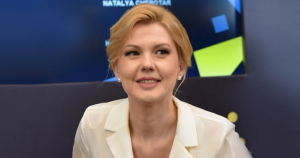
Influential lawmaker linked to ‘Rakova case’

The so-called ‘Rakova case’ is fast becoming one of the most significant criminal cases to be investigated in Russia this year. So far, it has implicated former deputy minister Marina Rakova and the head of one of the country’s last surviving independent universities. Since we last reported on the case, The Bell established that the criminal investigation was preceded by a conflict over multi-billion ruble state contracts involving Russia’s largest high school textbook publisher that is controlled by veteran lawmaker Oleg Tkach.
- Sources who spoke to The Bell described Rakova as a “harsh” and “uncompromising” bureaucrat, but acknowledged she did a great deal for education. “Without Rakova there would be no Quantorium,” one admitted. Quantorium was Rakova’s signature achievement in government: 135 study centers in 84 of Russia’s 85 regions. Each one is different, but they generally have expensive facilities to provide free teaching of subjects like coding, robotics, microbiology, and 3D-modeling. They are funded by a mix of government and corporate money.
- There are no official figures, but the cost of each Quantorium center was estimated to be about 104.5 million rubles ($1.5 million). So, contracts for all the study centers built since 2015 would be worth a minimum of 14.1 billion rubles.
- Officially, the Rakova case is not linked to Quantorium. Instead, Rakova is accused of fraud over research her ministry commissioned from the Moscow Higher School of Social and Economic Science (Shaninka). Rakova is currently in prison, as is her partner Artur Stetsenko, two former government colleagues, Yevgeny Zak and Maksim Inkin, and Kristina Kryuchkova, former executive director of Shaninka. Sergei Zuev, rector of Shaninka, is under house arrest.
- Nevertheless, it was Quantorium that led to Rakova acquiring influential enemies and may provide the key to understanding why she is now behind bars, five different sources told The Bell. One of Rakova’s biggest conflicts was with the Prosveshcheniye publishing house, which enjoys a virtual monopoly on the production of textbooks for Russian high schools.
- However, as well as textbooks, Prosveshcheniye is involved in equipping educational buildings. And, according to three people close to the project, it had plans for Quantorium — Prosveshcheniye wanted to supply equipment to the study centers.
- Rakova often spoke out internally against Prosveshcheniye’s lobbying, an Education Ministry source told The Bell. A former colleague of Rakova’s said the publishing house pushed for changes to procurement procedure. “Rakova successfully resisted this pressure,” said one official. “She was able to uphold high standards, ensuring schools did not receive laptops that had to be scrapped within a year.”
- When Rakova left government earlier this year for a senior position at state-owned Sberbank, the conflict did not end. In May 2021, Sberbank, development bank VEB.RF and state-owned Russian Direct Investment Fund reached a deal to buy 25 percent of Prosveshcheniye. Rakova was in charge of Sberbank’s involvement and joined the publisher’s board of directors on behalf of the bank. The bad blood continued to be an issue in her new role, several of her acquaintances said.
- Prosveshcheniye was set-up in the Soviet Union to produce high school textbooks (effectively holding a monopoly on this business). However, in the 20 years following the collapse of Communism, its market share dropped to 35 percent. It was bought in 2011 by Olma Media, a small publishing house owned by senator Oleg Tkach and his business partner, Vladimir Uzun. For the purposes of the deal, Prosveshcheniye was valued at about 2.25 billion rubles and Tkach and Uzun got the money from SMP Bank, which is owned by billionaire brothers Arkady and Boris Rotenberg — who are also close friends of Putin. Prosveshcheniye backed out of a planned IPO in 2017 because of the risk posed by U.S. sanctions.
- Now, Prosveshcheniye once again has an effective monopoly on the production of high school textbooks. In effect, the state guarantees the publisher rising profits.
- Tkach is known as one of the most influential members of Russia’s upper house of parliament. In a rating of influence compiled by NGO Transparency International, he ranks higher than Federation Council speaker Valentina Matvienko and deputy speaker Nikolai Zhuravlyov. Of 17 laws he has proposed, 14 were passed.
Why the world should care: For some time now, the Russian government has been investing large sums of money in high school education, and textbooks are seen to be of particular importance in shaping the outlook of young people. Rakova evidently made some powerful enemies.



